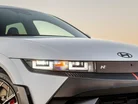Hyundai brand value soars on back of sustainability vision

Hyundai Motor Company's brand value has reached US$20.4 billion, marking unprecedented growth.
That’s according to Interbrand's just-released Best Global Brands 2023, which saw the South Korean automaker’s valuation ascend by 18% advancing three spots to 32nd most valuable brand in the world.
This rise marks the first increase in brand valuation for Hyundai since 2016, and points to the leading role it is taking in the automotive industry’s paradigm shift.
Armed with a vision of ‘Progress for Humanity’, Hyundai is transitioning from being a car company to imagining mobility solutions far into the future.
According to Interbrand, Hyundai is not only “making big strides in forwarding its vision of 'Progress for Humanity' through the IONIQ brand”, but “continues to impress with its authentic communication regarding core human values such as sustainability”.
Since its debut on Interbrand's 'Best Global Brands' in 2005 with a valuation of US$3.5 billion, the numbers have multiplied nearly six times. In 2014, Hyundai's brand value reached US$10 billion, and for the first six years, its valuation rose US$4 billion.
Then came the appointment in 2020 of Euisun Chung, the Group's Executive Chair – who, with his innovative and visionary thinking, has catapulted the carmaker’s valuation, jumping US$6 billion in just three years.
The powerful vision of Euisun Chung
In taking the helm of the Group, Chung delivered a bold vision for the Group’s transformation into a smart mobility solutions provider with sustainability at the brand’s core.
Under Chung’s leadership, the Group is innovating in bringing new mobility solutions to market – accelerating its deployment of robotics and AAM technologies and exploring their role in future smart city development.
Chung is also spearheading the Group’s transformation into a provider of human-centered mobility solutions, “committed to making our mobility vision a reality to benefit all humanity”.
And he has been widely recognised for his vision of a sustainable future.
In 2022, he was named Visionary of the Year at Newsweek’s World’s Greatest Auto Disruptors Award – recognising not just his integral role in the rise of Hyundai and Kia, but his ability to push the boundaries in the automotive industry, using technology to positively impact people’s lives.
And this year, as well as topping MotorTrend Group’s 2023 Power List, Chung recently received a CBE by His Majesty King Charles III for his contributions to eco-friendly electrified mobility.
The Hyundai vision – Progress of Humanity
So, what is the Hyundai vision?
Called 'Progress for Humanity', Chung's vision imagines a future where people and goods can move more efficiently through advanced air mobility, autonomous cars and purpose-built vehicles, all powered sustainably via batteries or hydrogen fuel cells.
It's a future where automation and robots can make people’s lives easier, where cities are carbon neutral, powered by hydrogen fuel cell generators and distributed through smart grid pipelines to power buildings.
Among many innovations, Hyundai has Introduced ground-breaking EVs, such as the Hyundai IONIQ 5 and INOIQ 6, opened a US$1.53 billion EV-dedicated plant, announced plans to produce Purpose Built Vehicles and robotaxis, and through its HTWO brand, is powering next-gen hydrogen fuel cell research for hydrogen-based powertrains.
Through the Group’s Advanced Air Mobility company, Supernal, Hyundai is looking to commercialise eVTOL vehicles in 2028, and with Boston Dynamics, part of Hyundai, is making huge advances in automation and robots.
Human-centric approach to manufacturing
In taking a human-centred approach to mobility and to manufacturing, Hyundai recently opened two new innovation-driven facilities and announced a third – with plans to open a state-of-the-art automotive manufacturing plant in Saudi Arabia, a joint venture with PIF.
Among the new openings, Hyundai recently inaugurated its US$1.53 billion EV-dedicated plant in Ulsan. Along with the capacity to produce 200,000 EVs per year, the plant takes a human-centred approach featuring an innovative manufacturing platform to deliver an optimal working environment for employees.
Also new is Hyundai’s first industry-changing smart urban mobility hub.
Located in Singapore, the Hyundai Motor Group Innovation Centre Singapore (HMGICS) includes a highly automated flexible production system and provides unprecedented ways for electric vehicle (EV) buyers to interact with their vehicles and the Hyundai brand.
Delivering a human-centric manufacturing approach, HMGICS elevates collaboration between people, robotics, and AI technology to new levels of synchronisation. In addition, digital twin Meta-Factory technology will ensure ultra-rapid responses to changing customer demands and production requirements.
"As the automotive industry undergoes a transformation, Hyundai Motor is exploring future mobility solutions to respond to fast-changing consumer needs," says Sungwon Jee, SVP and Global Chief Marketing Officer at Hyundai Motor Company.
"We are committed to a better future for all of humanity."




